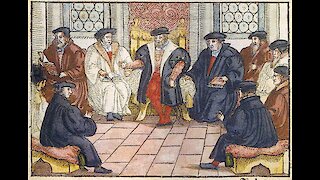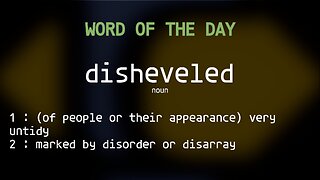Word of the Day: Peccant
Did You Know?
Peccant comes from the Latin verb peccare, which means "to sin," "to commit a fault," or "to stumble," and is related to the better-known English word peccadillo ("a slight offense"). Etymologists have suggested that peccare might be related to Latin ped- or pes, meaning "foot," by way of an unattested adjective, peccus, which may have been used to mean "having an injured foot" or "stumbling." Whether or not a connection truly exists between peccant and peccus, peccant itself involves stumbling of a figurative kind—making errors, for example, or falling into immoral, corrupt, or sinful behavior.
Examples
"Cavil at Dylan Thomas's overdoings; praise this bit and dispraise that bit; but there he was, there he is, an emblem of poetry, which is Being itself…. And the world honored him for it, while chopping him to pieces…. It's the loony, peccant villagers of Under Milk Wood…. It’s Auntie Hannah in 'A Child's Christmas in Wales,' who liked port, and who stood in the middle of the snowbound back yard, singing like a big-bosomed thrush.'" — James Parker, The Atlantic, December 2014
"The book stands for all the right things, and is peccant only in two minor but irritating ways. That there are occasional errors—'deprecatingly' for 'depreciatingly,' 'a bookstore which' for 'a bookstore that,' a couple of faulty agreements and a captious attack on the useful word 'demythify'—is not so much Newman as human." — John Simon, Paradigms Lost, 1980
But there is one touchstone by which the peccant element in them may be at once detected.
This idea had occurred to Joe from his remembrance of a peccant hound in the grasp of a tyrant whip.
That the peccant material is to be eliminated gradually by mild remedies, just as it accumulated by degrees.
Maisie looked at the peccant places; there were moments when it was a relief to her to drop her eyes even on anything so sordid.
-
 0:30
0:30
OddManOut
4 years agoWord of the Day : Colloquy
172 -
 0:29
0:29
OddManOut
4 years agoWord of the Day : PREMEATE
72 -
 4:58
4:58
Recitations and More
3 years ago $0.02 earnedWords of My Generation; Generation Why
921 -
 0:32
0:32
LingoCentre
3 years agoWord Of The Day - Name
10 -
 1:25
1:25
Chili Bu Revolution of the Mind, Body & Soul
1 year agoHISTORY LESSON ON THE WORD CUNT
134 -
 0:30
0:30
LingoCentre
6 months agoWord Of The Day 117
1 -
 0:52
0:52
The BARD ai Jester Tells bad jokes
11 months agoFloccinaucinihilipilification Word of the Day
4 -
 16:00
16:00
Trumpet Call of God
8 months agoMarch 7, 2011 🎺 Consider My Words and prepare, for the Day of Refinement is here
56 -
 13:10
13:10
Jesus' Revelations thru Jakob Lorber English
1 year agoAs in the Days of Noah... Consider the Fruit of such great Literacy ❤️ Jesus explains Matthew 24:37
192 -
 0:52
0:52
The BARD ai Jester Tells bad jokes
11 months agoFloccinaucinihilipilification Word of the Day
4